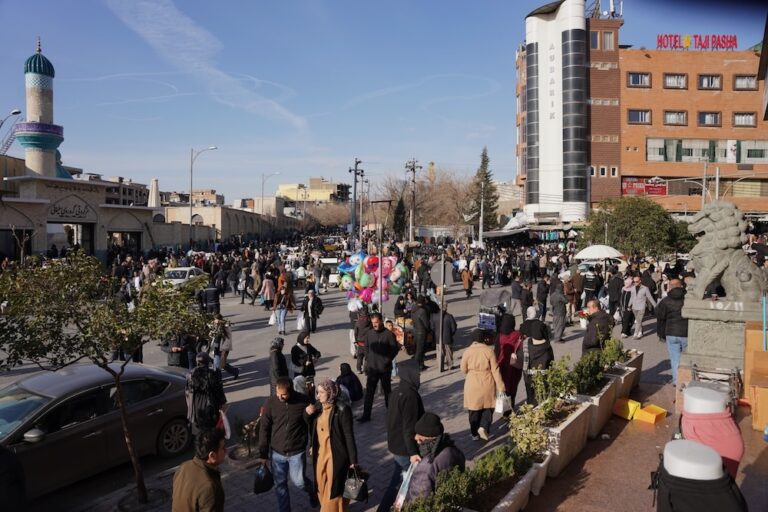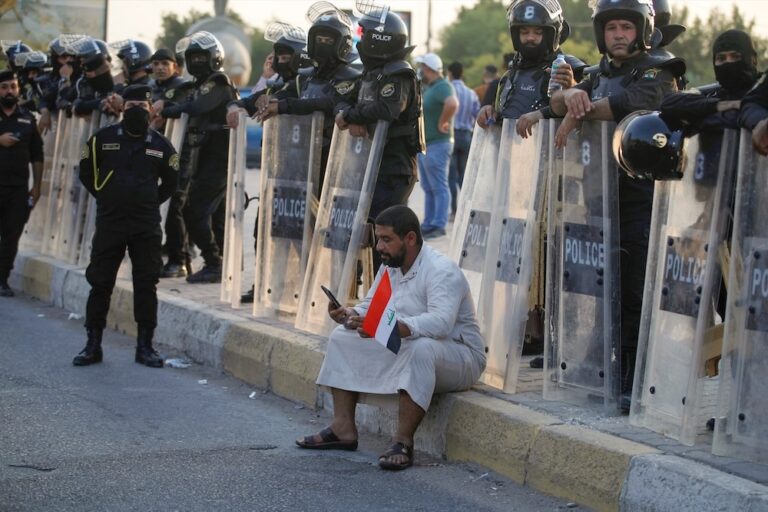(RSF/IFEX) – On 3 April 2003, RSF accused the Iraqi regime of showing contempt for foreign journalists, imprisoning and expelling some, and preventing the rest from working with even a minimal level of freedom. In a letter to the Iraqi interests section in Paris, RSF Secretary-General Robert Ménard said the Iraqi authorities’ attitude toward foreign […]
(RSF/IFEX) – On 3 April 2003, RSF accused the Iraqi regime of showing contempt for foreign journalists, imprisoning and expelling some, and preventing the rest from working with even a minimal level of freedom.
In a letter to the Iraqi interests section in Paris, RSF Secretary-General Robert Ménard said the Iraqi authorities’ attitude toward foreign journalists who were trying to cover the war from Baghdad and other cities in Iraq was “scandalous, contemptuous and hostile.”
Ménard noted that four journalists were accused of spying and thrown in prison for a week, around 10 others had been expelled since the start of the war, and two reporters with the Qatar-based television news channel Al Jazeera were banned from working in Iraq.
The restrictions imposed on the way foreign journalists can work were also “intolerable,” Ménard said. “Guided bus tours organised by the authorities are insufficient and do not meet the minimal criteria of media freedom we expect.”
On 2 April, the Iraqi Information Ministry banned Al Jazeera correspondent Diyar al-Omari from working and ordered order another Al Jazeera reporter, Tayssir Allouni, to leave the country immediately. The pan-Arab news channel said it regretted this decision and announced that it was suspending coverage of the war by all of its correspondents in Iraq. Al Jazeera will continue to transmit pictures because of agreements with other television stations, but its crews in Baghdad, Basra and Mosul are expected to stop working.
On 1 April, the Iraqi authorities released four journalists accused of spying for the United States (U.S.). Matthew McAllester and Moises Saman, of the New York daily “Newsday”, and freelance photographers Molly Bingham and Johan Spanner were then escorted to the border with Jordan. They had been arrested a week earlier in their hotel, the Hotel Meridien Palestine, and held for a week in Abou Ghreib prison, on the outskirts of Baghdad.
Also on 1 April, reporter Peter Wilson and photographer John Feder, from the London-based newspaper “The Australian”, were arrested in Basra with their Anglo-Lebanese interpreter Steward Innes and escorted to Baghdad, where they were confined to the Hotel Meridien Palestine for “entering the country without a visa”. They expect to be expelled, as many other journalists have already. The three, who were not “embedded” with coalition units, entered Iraq from Kuwait on 26 March. British and U.S. military police had also tried to detain them.
The Iraqi authorities have also confined seven Italian journalists to the Hotel Meridien Palestine since 29 March. According to the Italian newspaper “Corriere della Sera”, their computers, telephones and passports have been confiscated. The seven, who also expect to be expelled, are Franco Battistini, of “Corriere della Sera”, Ezio Pasero, of “Il Messaggero”, Luciano Gulli, of “Il Giornale”, Leonardo Maisano, of Milan’s “Sole 24 Ore”, Toni Fontana, of Rome’s “Unita”, Lorenzo Bianchi, of Bologna’s “Il Resto del Carlino”, and Vittorio dell’Uva, of Naples’ “Il Mattino”.
Ian McPhedran, of Australia’s “Daily Telegraph”, was ordered to leave Iraq on 31 March for “breaking the rules” by leaving his hotel without an escort to go to the Information Ministry, which had been bombed. He was expelled, along with Bonny Shoonakker, a reporter with South Africa’s “Sunday Times”.
As part of its monitoring of a war that is proving hard for journalists to cover, RSF’s website, www.rsf.org, offers a constantly updated “barometer” of the number of journalists killed, wounded and missing in the course of their work in Iraq.


